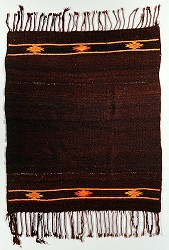 |
|
| Home |
|

Tarahumara Blanket ca. 1982 Chihuahua, Mexico Catalog Information |
 |
Description |
|
This blanket is woven entirely from handspun wool yarn and colored with natural dyes. A band of geometric design motifs framed by stripes is found at each end. This style of Tarahumara blanket is still common today, and museum collections document its existence at least as far back as the 19th century. This blanket is a good example of how textiles reflect the flow of ideas across cultural boundaries. When the Spanish arrived in northern Mexico in the sixteenth century, they discovered that the ancestors of the Tarahumaras did not use cotton for weaving like most of their neighbors. Instead, they relied on wild plant fibers like maguey and Indian hemp. With the arrival of the Spanish, sheep became available to the Tarahumaras who eagerly formed their own flocks and replaced these plant fibers with wool. Interestingly, however, they did not change their basic approach to textile production—weaving continued to be the responsibility of women, who worked on the traditional horizontal loom. |

|
Gallery | Map | Timeline | Glossary | Catalog | About | Home |